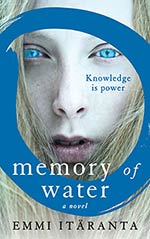
![]() bazhsw
bazhsw
4/30/2015
![]()
I found this novel to be quite delightful in many respects. It's a book that is never hurried, but at the same time is difficult to put down. I felt drawn in gradually by the story before I found I couldn't escape.
Itäranta writes beautifully. Other reviewers have stated that her prose is 'understated' which I think is accurate. Her language is poetic and gentle. This is in contrast to the harsh dystopia in which the novel is set.
Noria Kaitio is apprenticed to her father who is a tea-master. Ostensibly the tea master serves tea following an ancient ceremony, quite close to what Japanese tea ceremonies are today. There is a focus on ceremony and the nature of tea and water, indeed water and it's nature is the core theme of the book.
The novel is set in a post-apocalypse dystopian future. Global warming has melted the ice-caps and large swathes of the planet are now underwater. The temperature is hot and fresh water is scarce or non-existent. Effectively, the state purifies salt water for washing and drinking. So water is a scarce commodity, which the state effectively uses as a means of control. The state appears to be a military dictatorship which behaves with the totalitarian cruelty one might expect. The contrast between this cruelty and the prose is particularly effective.
Water as the giver of life and the bringer of death is a notion as old as time itself and the idea of water flowing through time and having memory is explored quite strongly.